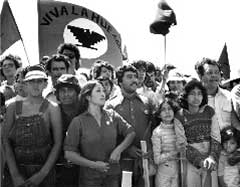
Forty-five years ago on this date, August 24, 1970, the United Farm Workers Organizing Committee (UFWOC) leader César Chávez called for a consumer boycott of lettuce to support the strike against lettuce growers who would not negotiate contracts with farm workers for decent wages and working conditions. UFWOC was the predecessor organization to the United Farm Workers (UFW). The Delano grape boycott had recently shown some success, and the union was eager to advance workers’ claims into new fields.
To keep the UFW out of California lettuce and vegetable fields, most Salinas Valley growers signed sweetheart contracts with the Teamsters Union. Some 10,000 Central Coast farm workers respond by walking out on strike. The UFW used the boycott to convince some large vegetable companies to abandon their Teamster agreements and sign UFW contracts.
The so-called Salad Bowl strike was a series of strikes, mass pickets, boycotts and secondary boycotts that led to the largest farm worker strike in U.S. history. Shipments of fresh lettuce nationwide virtually ceased, and the price of lettuce doubled almost overnight. Lettuce growers lost $500,000 a day. A state district court enjoined Chávez personally and the UFW as an organization from engaging in picketing, but both Chávez and the union refused to obey the court’s orders.
Violence against UFW workers became increasingly widespread in the fields. On November 4, 1970 a UFW regional office was bombed.
Chávez spent from Dec. 10 to 23 in jail in Salinas, Calif., for refusing to obey the court order. Former Olympic gold medal-winning decathlete Rafer Johnson, Coretta Scott King, widow of Dr. Martin Luther King, Jr., and Ethel Kennedy, widow of Robert Kennedy, visited him in jail.
On March 26, 1971, the Teamsters and UFW signed a new jurisdictional agreement reaffirming the UFW’s right to organize field workers, although Teamsters did continue to organize in some places, with frequent violent attacks on UFW members. The Teamsters finally left the field in 1973.
After a dramatic 110-mile march from San Francisco, which gathered more than 15,000 people by the time they reached the E & J Gallo Winery in Modesto on March 1, 1975, UFW’s persistent action led directly to the passage of the California Agricultural Labor Relations Act, which went into effect on August 28th. The UFW organized thousands of agricultural laborers into unions, in many cases winning recognition and negotiated contracts.
After hundreds of elections under the law in its first two years, the UFW and Teamsters finally signed a long-lasting jurisdictional agreement in March 1977, and the UFW ended its boycotts of lettuce, grapes, and wine in February 1978.
Adapted from ufw.org and Wikipedia.
Photo: peacebuttons.info












Comments